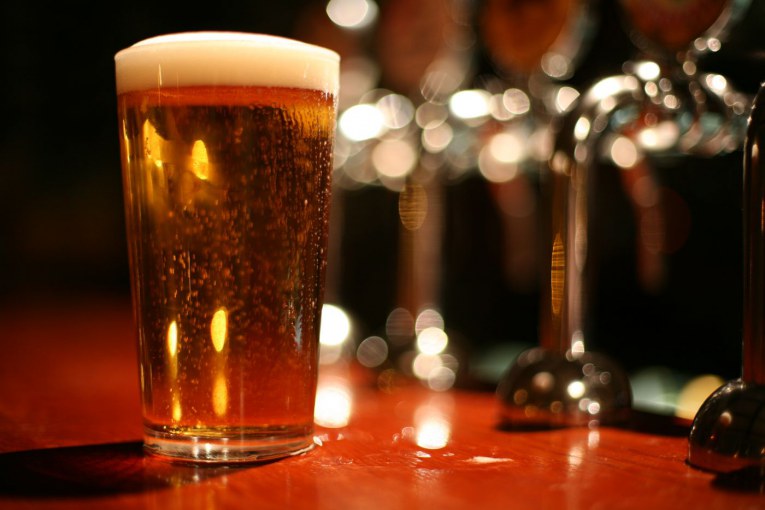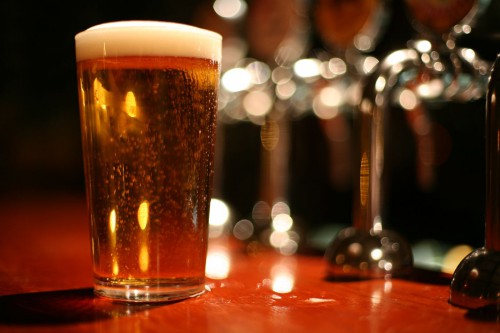

The issue of the late night downtown scene returns this week to the city council, following the moratorium that was imposed on new large downtown businesses in the wake of the September murder at KetMoRee. Council will not act on the staff recommendations this week, but rather will provide direction for potential future ordinances.
Staff argues, “When improperly managed, entertainment venues (such as nightclubs and bars) can contribute to crime and disorder. This phenomenon is demonstrated in the downtown core where there is a high density of drunk in public and violent incidents.”
Staff argues that the five-year review of data shows an increased number of violent incidents in and near the downtown establishments. I would argue that the violent incidents may or may not be increasing – the graphic shows them jumping from 162 to 219 in 2012, and from 219 to 254 in 2014, before dropping to 209 last year.
Staff argues, “A review of crime suggests that the overall atmosphere of downtown has changed over time. Specifically, the data demonstrates that the percentage of gang-related, violent, and weapons-related crimes involving on-sale alcohol licensees have increased dramatically over the last five years and was the highest in 2015.”
At the same time, the staff acknowledges, “Immediately following the homicide in September 2015, the frequency of drunk in public and violent incidents in the downtown area significantly decreased. Although speculative, the decrease observed may be attributable to the increased attention this area received from a variety of sources (press, law enforcement) subsequent to the homicide. Increased attention may have contributed to greater compliance or ‘better behavior’ from both patrons and on-sale licensees.”
One of the questions before the council is whether to impose a “hard” closing time on new and existing bars.
The staff reports notes that, while most of the preliminary conditions were acceptable to bar owners, a hard closing time of prior to 2:00 am is strongly opposed.
Concerns expressed here and elsewhere are the possibility that “a hard closure time increase the numbers of private parties occurring in residential neighborhoods? A majority of the bar/nightclub business actually starts after 11:00 p.m. There is some thought that if bars/nightclubs stopped serving at midnight or 1:00 a.m. then the student-aged crowd would simply resort to house parties to socialize.”
Additionally, we and others have expressed the view that “a hard closure time in Davis [may] cause the student-aged crowd to leave Davis and drive to other communities, like Sacramento, instead.”
Staff notes, “The City cannot directly impose rules (by ordinance) that restrict alcohol sales to certain hours. This is an area where the City is preempted by State law which establishes that alcohol can be sold until 2:00 a.m. (assuming the ABC license does not contain a sales restriction). However, the City can require a CUP [conditional use permit], which may set operating hours different than a 2:00 a.m. closure, which could be used to create a hard closure. Alcohol sales are only indirectly controlled through the CUP.”
Other cities like Sacramento use what is known as a “soft-closure.” Under this scenario, “the entertainment establishment may be prohibited from allowing new entry and/or reentry after an established time (1:00 a.m.). Additionally, the entertainment establishment is prohibited from having lines for customers wanting to gain admittance after a set time.”
Staff reports that Sacramento believes these requirements contribute to a reduction in problems. Staff notes that there is strong opposition in making any zoning changes and imposing hard closing times, but “there seems to be less opposition to imposing soft closing times, especially when faced with a choice between hard closure or a soft closure.”
While staff believes a hard closure, of not allowing nightclubs to operate past midnight, would result in fewer alcohol-related problems, there are questions about “whether we would see increases in other party behavior, which could be less controlled, and whether the student-aged crowd would simply go to Sacramento and create other safety issues.”
Any answer to those questions, staff believes, is “speculative.”
However, having a soft closure might reduce or eliminate those issues. The argument is that the business would remain open and serving alcohol up until 2:00 am. Second, it would reduce “the problems associated with constant movement of patrons from bar to bar and the problems associated with people who have already consumed alcohol standing (in) lines for long periods. Patrons would have to pick their place by a certain time and then either stay there or, if they chose to leave, they won’t gain entry into another establishment. This allows servers to monitor consumption or overconsumption (a person cut off at a location would not then gain entry into another location).”
Moreover, adopting these rules would mean Davis businesses operate under the same conditions as Sacramento and, therefore, it is less likely that students would travel across the causeway.
From the Vanguard’s standpoint, a soft closure time would reduce our concerns about the impact of a hard closure. The question is whether the soft closure would address enough of the community concerns.
—David M. Greenwald reporting

Yeah, Tres Hermanas distributed “better behavior” by shutting itself down.
This seemed to focus on the hard vs. soft closure. I’m opposed to a hard closure.
There were about four ‘bad actors’ in the downtown nightclub scene. If the conversion morphers to nightclubs can be addressed to curtail the nightclub scene, the other downtown businesses should not suffer. The changes I saw downtown Thu-Sat 11pm-2am starting in about 2008 getting progressively worse were directly attributable to the nightclub from restaurant morph. Solve that, and you solve the worst of the problems. I don’t believe the other late-night businesses should suffer in the name of “fairness”.
Target the problem child. Downtown during these times is so much less insane now! I hope we don’t see a backslide when things settle, or when Blondie’s moves in. Nor do I want to see the whole of downtown shutting down arbitrarily early. In college at UCD we had something called D.P.T. — no matter what time you told people to come to the party, they came at D.P.T., Davis Party Time. Students hit downtown clubs between 10pm and 11pm, and nothing will change that. Shutting down early will not stop the party, it will just drop an ACME safe into the party.
I think a 1 am soft closer is a good starting point. We can always get tougher if it doesn’t work.
The other thing that needs to be addressed is the low frequency sound waves from the sub-woofers of the nightclubs. Right now Tres Hermanas doesn’t spew-out this problem currently because it doesn’t operate — but it could start right back up after the ordinance passes. Ket Mo Ree, Froggies (occasional), and Uncle Vito’s have been much quieter, and Our House has never used sub-woofers that have propagated far outside its borders. (Pardon me scientists and evidence-based types, these are my observations passing through downtown during party hours for years, no team of scientists with meters and a federal grant to produce hard sonic numbers for you). Blondies is an unknown on this, but from all accounts of its business model I am not hopeful.
That’s why we need a low-frequency sound ordinance as party of this. Most especially as more and more are going to be living downtown as it builds up and has more housing-over-retail. You can’t mix housing with sonic bass pollution late night. Not all students party late night (most don’t – who knew?), and not all who will live downtown are students.
Low-frequency sound waves? What about my 1000 watt car stereo and my Harley?
“You can’t mix housing with sonic bass pollution late night.”
I agree with this statement. Maybe we should have less housing, or keep it housing that only young single people would be attracted to.
One thing I think needs to be addressed is that if old fuddy-duddies are going to live near to the downtown, they better either have some tolerance or invest in noise cancelling. Jesus Christ. You did know you were close to the downtown when you moved in, right?
Dear Big P, I have two other large letters for you: one is an F, and the other is a U. No one should have to put up with being able to make out the bass lines of songs for a quarter-mile away from the nearest sound source. Davis has a good noise ordinance, but it did not cover the subwoofers from nightclubs, because they didn’t exist when it was written.
I have lived in and near the downtown since 1984, well over two decades before the first low-frequency sound waves were emitted from a morph nightclub. It’s not like I moved into the path of an airport and complained about the airplanes. The airport was built next to us . It shut down due to a murder, and though I hate the reason it shut down, it is been much more pleasant. Nice to be able being able to go to sleep on Thursday Friday and Saturday .
And noise canceling does not work for the frequencies it subwoofers emit.
I am disgusted with those who criticize the issues that go on in other people’s neighborhoods without having to experience it themselves. You’re all a bunch of A-holes.
[moderator] Please stop calling people names. https://davisvanguard.org/about-us/comment-policy/
Mod-rater: From the Vanguard-policy-approved perch of cowardly anonymity, someone calls me a name and makes accusations of me which are incorrect. I am going to damn well call them out on it. If the Vanguard would ban anonymous cowards from accusing and insulting the rest of us, there would be no need for a reply.